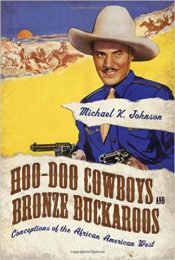The westward expansion in the 18th and 19th century is well documented and was done by (what we believe) an entirely white/Caucasian group of people who took their chances and finally settled the West; if we believe the many tales, novels and most importantly the countless western movies.
 But actually, there were also some others, some colored, families and individuals, from all possible nations doing just this; among them, a few freed American former slaves, too.
But actually, there were also some others, some colored, families and individuals, from all possible nations doing just this; among them, a few freed American former slaves, too.
This fact and the hardly documented history of the presence and the settlements of African Americans in the West makes research problematic, claims author Michael K. Johnson: “Beginning the task to understanding the African American West requires that we let go of the paradigms that limit our ability to strike out into new territory as well as revise and expand the ways literary history has conceptualized the West as a field of study.”
Only in recent years have there been serious efforts to research the African American history of the western settlement at all, followed by a small number of academic publications. At the same time, there have been hardly any studies focusing on Western novels by black authors. What came to the aid of Johnson, associate professor of English at University of Maine at Farmington, are the newly discovered writings of one Rose Gordon, a black contributor to a Montana newspaper in the 1950s.
Those articles recreate her history as she tells of her parents’ life, emancipated former slaves, who made it to Montana territory. Many others followed and between 1870 and 1920 the black population in the western mountain states increased thirteen-fold.
Johnson’s best chapter “The Post-Soul Cowboy on the Science Fiction Frontier” is the logical next step after dealing with musical tricksters (such as those presented in the writings of W. C. Handy and Taylor Gordon), fiction and movies by Oscar Micheaux and the largely changing types of black westerners of the 1960s and 1970s in the movies and on TV in the sections before. The many all-black-cast Westerns with actor/jazzman Herb Jeffries (who became famous as “The Bronze Buckaroo”) may have been the most popular media of this kind in the 1940s, but even these films are largely forgotten now. Naturally, they receive coverage here as well.
In the book’s concluding chapter, Quentin Tarantino’s Django Unchained indicates for Johnson clearly a new stage in the design of the black hero and the presentation of American history in general, since the slavery plot here suggests the movie’s “affinity with the civil rights Western, as the film’s explicit depiction of the realities of slavery serves as a protest against the whitewashing of that history in both the southern Western and American cultural memory in general.” (While at the same time, director Tarantino obviously was completely unaware of the tradition of the African American Western movie).
In Hoo-Doo Cowboys and Bronze Buckaroos author Johnson presents his rich study of all kinds of media, newspaper articles, novels, memoirs, diaries, songs, movies, folktales and letters to present a clearer picture of the historical (and fictional) accounts of the black experience in the West. A rare and convincing work for anybody interested in African American studies.
Review by Dr. A. Ebert © 2016
Michael K. Johnson. Hoo-Doo Cowboys and Bronze Buckaroos. Conceptions of the African American West. University of Mississippi Press, 2014, 296 p.
